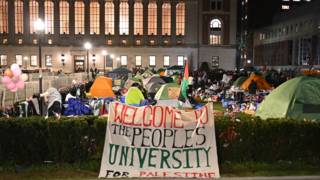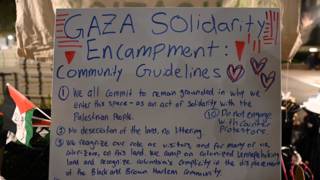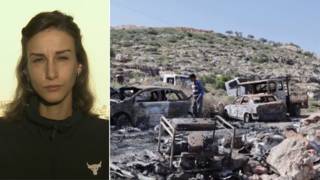
Related
Guests
- Tom Goldtoothexecutive director of the Indigenous Environmental Network (IEN), headquartered at Bemidji, Minnesota. He is Dine’ and Dakota.
Tom Goldtooth is executive director of the Indigenous Environmental Network headquartered at Bemidji, Minnesota. For over thirty years, he has been an environmental and economic justice leader in the Native American community. He joins us to talk about the congressional climate change bill and Native American efforts to address the resource extractions causing environmental degradation in their communities. [includes rush transcript]
Transcript
JUAN GONZALEZ: To continue the discussion about climate change, we’re now joined by Tom Goldtooth, executive director of the Indigenous Environmental Network headquartered at Bemidji, Minnesota. He is in New York this week for the United Nations Permanent Forum on Indigenous Issues. For over thirty years, he has been an environmental and economic justice leader in the Native American community.
Tom, welcome to Democracy Now!
TOM GOLDTOOTH: Yeah, thank you for inviting me.
AMY GOODMAN: It’s great to have you with us. Well, you heard the debate on the climate bill. What are your thoughts?
TOM GOLDTOOTH: Well, I think the bill, unfortunately, has been co-opted by the oil and coal industry. You know, it’s a situation again where we have politics over science. And our network and our constituency, who are on the frontline of unsustainable energy policy, from Alaska all the way down to the tip of Argentina, we network with indigenous people in Nigeria, you know, all over. It’s business as usual. And, you know, we don’t see democracy in the process of how decisions are being made around climate policy, whether it’s domestically, like the Waxman-Markey bill, or whether it’s globally. You know, it’s business as usual.
We’ve got people in these indigenous communities, where, you know, fossil fuel development is expanding, you know, amongst this contradiction where people are coming together to try to address climate change. And, you know, from Alaska, they’re fighting offshore drilling, the Alaska natives, because they’re really concerned. The human rights issues. You know, there’s continued systematic violations by the oil, fossil fuel, coal, and it just continues.
So, this bill here — you know, we had high hopes, and we still do, and it’s going to take political will of the people, though. You know, and it was really interesting, one of the comments is that — you know, from one of the presenters about how these decisions are being made behind closed doors. And that’s something that’s really a big concern of us here as American Indian and Alaska natives, is that tribes have been locked out of the process of debate, as well as our communities and many of the people in America. It’s done behind closed doors between the big environmental organizations, industry. You know, just the US Climate Action Partnership is all, you know, big NGOs and companies.
AMY GOODMAN: Can you talk about the first Indigenous Peoples’ Summit that took place in Alaska and what came out of that?
TOM GOLDTOOTH: Oh, definitely. I mean, we’re — you know, as indigenous peoples — and we use that term because we were part of the 350 million indigenous peoples throughout the world. And we’ve been coming together on many different issues, being very strategic. And this is our first time we came together globally, bringing indigenous peoples from every region in the world. Four hundred indigenous peoples came together to discuss the impact of climate change.
We all, you know, agreed with the concerns that we’re on these frontlines with disproportionate impact. This is a climate justice issue. There has to be a human rights framework to address this issue, and there isn’t. In fact, this is a first time that we came out of a meeting such as this in consensus, that we’ve got to have aggressive targets, emission targets, I’m talking about. So we agreed that we need to push the Annex I countries, which are the industrialized countries like America and Canada, that we need to reduce these CO2s and concentration of greenhouse gas emissions by 45 percent by 2020, and using 1990 levels, and 95 percent or even 100 percent by 2050. We have the technology to do that.
JUAN GONZALEZ: Now, most Americans are not aware of the enormous amount of mineral extraction that is going on on native lands throughout the hemisphere, really. I know there’s been a big battle in Minnesota over some oil pipelines there, as well. Could you give us a sense of some of the worst examples around the country?
TOM GOLDTOOTH: Yes. I mean, it’s part of the inconsistencies we see, as we have our leadership addressing climate issues in this country, you know, from the Beltway, when we see business as usual again. You know, we have this massive infrastructure, one of the biggest industrial projects that I’ve seen throughout the world, and it’s coming out of an agreement that was made between the Bush administration and Stephen Harper, Prime Minister of Canada, to transport this dirty oil, tar sands, from Alberta, Canada, which is the homeland of the Dene and the Cree and the Metis people. You know, they’re dying of cancer. Their water is contaminated in this process of taking this bitumen, this tar-like substance, out of the ground, out of the sacredness of Mother Earth, to feed the energy addiction of the United States. And so, there’s a big mega project here to get this oil to get refined here in the United States, which creates toxic hotspots.
You know, Canada is not meeting its Kyoto Protocol commitments, you know, like one of the persons speaking said. Canada, you know, is one of the major polluters, as well, with the United States. So it’s business as usual.
We have to demand aggressive action. You know, the people of America have been locked out of this whole discussion. There was a survey that was done about what people know about cap and trade. You know, I saw the survey just last month, you know, and the majority of the people don’t know what that is. And I would say a lot of the environmental organizations —
JUAN GONZALEZ: They know what cap and gowns are, but not cap and trade.
TOM GOLDTOOTH: They don’t know what cap and trade is.
AMY GOODMAN: What are you doing at the United Nations?
TOM GOLDTOOTH: Well, we’re meeting these two weeks around the topic of, how do we implement the Declaration on the Rights of Indigenous Peoples? And the United Nations General Assembly on human rights, they recently adopted, approved this, almost a twenty-year process of developing this instrument on recognizing the rights of indigenous peoples, the collective rights to exist as peoples. And it’s been a battle. United States did not accept that. They did not ratify that.
And so, you know, we’re meeting as indigenous peoples on developing strategy on how do we implement that at every level of governance, from local to national and internationally. That’s our challenge. And the Declaration on the Rights of Indigenous Peoples and recognition of our participation in the [UN] Framework Convention in Climate Change has not been recognized by that entity yet. So that’s what we’ve been talking about, as well as many other things.
JUAN GONZALEZ: What’s your response, in the previous debate from the Natural Resources Defense Council, when they say that this is the best bill that we’re going to be able to get at this stage, and at least it is a major step forward?
TOM GOLDTOOTH: I think it’s all about politics, a lot of compromising going on behind closed doors. You know, when you’re dealing there and trying to wheel and deal with the well-financed and very powerful oil and coal industry, you know, there’s a lot of compromise, a lot of negotiations.
And you’ve got these large environmental organizations that don’t have constituencies. So, you know, are they accountable to the people of America? Majority of them are not. And I think it’s a sellout position. I think the people of America, you know, are smarter than that. But, you know, America needs to have more understanding of where we’re at with climate change and what are market-based solutions that they are developing.
AMY GOODMAN: Tom, we just have twenty seconds, but, overall, your thoughts on President Obama?
TOM GOLDTOOTH: We’re very hopeful from Indian country, you know? We respect the giving of a native name by the Crow people, and he’s very open to having dialogue with our people. And, you know, there’s light at the end of the tunnel. But also, there’s a lot of forces surrounding him. And we need to continue to support him to make the right decisions. And this decision on this bill right now, you know, it takes away a lot of his authority. That’s my understanding. You know, we have regulations that we can enforce to push the industry to do the right thing.
AMY GOODMAN: Tom Goldtooth, I want to thank you very much for being with us, executive director of Indigenous Environmental Network.












Media Options